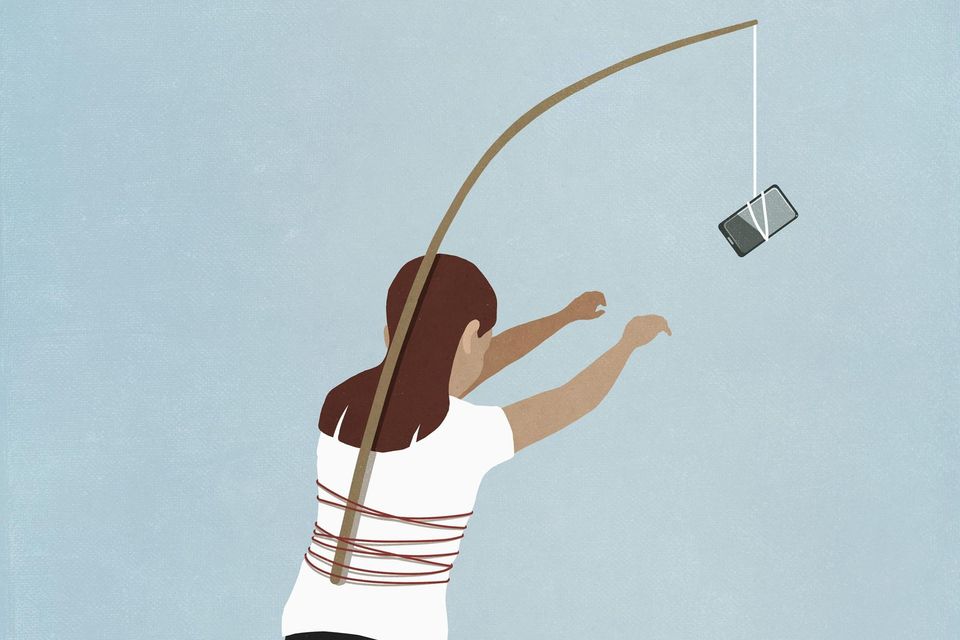‘Mam, Dad — we need to talk about your smartphones’
Parents, as well as kids, can get addicted to their devices. Illustration by Getty Images
June 1, 2024. A living room in Greystones, Co Wicklow.
It has been 12 months since parents’ associations of eight primary schools in the area agreed to stop children using smartphones until secondary school, to curb anxiety and delay exposure to adult material.
It is now 6pm one Saturday evening. Saoirse (12) and Cian (11) ask you, their 41- and 43-year-old parents, to come into the sitting room. They have something serious they want to discuss, they say.
“Mam, Dad,” says Saoirse. “We need to talk about the use of smartphones in this house. Cian and I have talked about it and we think it’s best for the family, and especially for you, to take away access to your smartphones. Just temporarily.”
You’re taken aback. “Sorry, what, what now?” you stammer. “Sorry, but you can’t be serious.”
“Mam, Dad, we are,” Saoirse replies in a kind-but-firm tone. She gently takes your hand and looks into your eyes, reassuringly, as she continues.
“They’re not healthy for you. Dad, you sit there in your chair glued to it and barely react when we ask you something or try to get you to play with us. Mam, you stare at it for hours in the evening, even when you’re watching telly. Both of you now look at it at the kitchen table. And when I had to go into your bedroom the other night because I was feeling sick, you were both just looking at your phones.”
You start to wail, conjuring up reasons why this is a stupid idea. All your friends and colleagues have a smartphone, you plead. You need it to keep up with things and with people. It’s not fair!
Read more
“Mam, Dad, you’ll survive just fine for a month without them. Think of all the things you can do. Dad, you haven’t read a full book since last year. Wouldn’t that be cool? Mam, you used to make fantastic art. How about giving that another shot?”
No, this is ridiculous, you argue. It’s completely unfair. You don’t know the way the world works. We need our smartphones. Everyone has one and we’ll be the odd ones out!
“Dad, we’ve seen you on your phone and you’re not talking to your friends, are you? You’re talking to strangers.”
That’s my business, you huff. That’s my right! You can’t control the way I think or who I talk to!
“No,” replies Saoirse, ever gently, but ever firmly. “But we just want to make sure that you’re safe and don’t get upset. Smartphones are great, powerful tools. But they can be very dangerous to your mental health, sometimes without you realising it. Mam, you keep talking about people in a mean way after looking at their Instagram or reading about celebrity stories. Dad, you’re always getting angry because of social media posts or tweets that you look up. And there’s another thing, too — you’re not talking to each other as much as you used to. We just care about you. That’s why we’re instigating this family rule. Don’t worry, you can have them back in a while. But let’s just try this, will we?”
With that, Saoirse and Cian take the iPhone and Samsung from your hands. You start to well up. One of you storms out of the room and stomps up the stairs, shouting: “I hate you!”
Saoirse shakes her head with a sad, but kind, expression. “Don’t worry,” she says to Cian. “That’s normal. Give them a little while.” Turning to the other parent, who is still there, she says: “We love you. Always remember that we’re doing this because we love you.”
And with that, the process that the Greystones parents kicked off in 2023 finally comes back to help the parents themselves.














